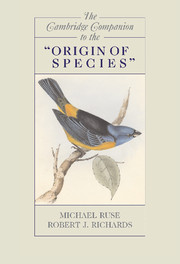Book contents
- Frontmatter
- Foreword
- Introduction
- 1 The Origin of the Origin
- 2 Darwin’s Analogy between Artificial and Natural Selection in the Origin of Species
- 3 Variation and Inheritance
- 4 Darwin’s Theory of Natural Selection and Its Moral Purpose
- 5 Originating Species: Darwin on the Species Problem
- 6 Darwin’s Keystone: The Principle of Divergence
- 7 Darwin’s Difficulties
- 8 Darwin’s Geology and Perspective on the Fossil Record
- 9 Geographical Distribution in the Origin of Species
- 10 Classification in Darwin’s Origin
- 11 Embryology and Morphology
- 12 Darwin’s Botany in the Origin of Species
- 13 The Rhetoric of the Origin of Species
- 14 “Laws impressed on matter by the Creator”? The Origin and the Question of Religion
- 15 Lineal Descendants: The Origin’s Literary Progeny
- 16 The Origin and Political Thought: From Liberalism to Marxism
- 17 The Origin and Philosophy
- 18 The Origin of Species as a Book
- Bibliography
- Index
Foreword
Published online by Cambridge University Press: 28 January 2009
- Frontmatter
- Foreword
- Introduction
- 1 The Origin of the Origin
- 2 Darwin’s Analogy between Artificial and Natural Selection in the Origin of Species
- 3 Variation and Inheritance
- 4 Darwin’s Theory of Natural Selection and Its Moral Purpose
- 5 Originating Species: Darwin on the Species Problem
- 6 Darwin’s Keystone: The Principle of Divergence
- 7 Darwin’s Difficulties
- 8 Darwin’s Geology and Perspective on the Fossil Record
- 9 Geographical Distribution in the Origin of Species
- 10 Classification in Darwin’s Origin
- 11 Embryology and Morphology
- 12 Darwin’s Botany in the Origin of Species
- 13 The Rhetoric of the Origin of Species
- 14 “Laws impressed on matter by the Creator”? The Origin and the Question of Religion
- 15 Lineal Descendants: The Origin’s Literary Progeny
- 16 The Origin and Political Thought: From Liberalism to Marxism
- 17 The Origin and Philosophy
- 18 The Origin of Species as a Book
- Bibliography
- Index
Summary
One hundred and fifty years past its publication, I believe we can safely say that the Origin of Species is the most important book of science ever written. Indeed, given its importance to all of humanity and the rest of life, it is the most important book in any category. No work of science has ever been so fully vindicated by subsequent investigation, or has so profoundly altered humanity’s view of itself and how the living world works. The theory of natural selection continues to gain relevance to the things that matter most to humanity - from our own origins and behavior to every detail in the living environment on which our lives depend. Little wonder that the adjective “Darwinian,” sometimes lowercased to “darwinian” as a tribute to its fixity, far outranks “Copernican,” “Newtonian,” and “Mendelian” in the frequency of usage.
The Origin won the day quickly for such a revolutionary proposal, so much so that Darwin could confidently publish The Descent of Man only twelve years later. It succeeded not just for the mass of evidence adduced to support evolution but because of the clarity and authority of its text. The quality of the mind that erected it did not come from the blue. For nearly three decades, extending from the departure of HMS Beagle from Plymouth on December 31, 1831, to the day in 1859 the Origin was sent to press, Darwin remained almost continuously absorbed in scientific natural history.
- Type
- Chapter
- Information
- Publisher: Cambridge University PressPrint publication year: 2008



